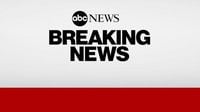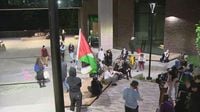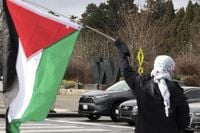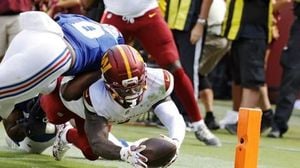In a dramatic escalation of campus activism, a group of pro-Palestinian students occupied the Interdisciplinary Engineering Building at the University of Washington on Monday evening, May 5, 2025. The students, part of a group known as Super UW, are demanding that the university sever its ties with Boeing, citing the aerospace giant's involvement in the ongoing conflict in Gaza. In a bold statement, they renamed the building the Shaban al-Dalou Building, after a teenage engineering student killed by an airstrike in Gaza.
The occupation began just before the building closed at 5 p.m., with a few dozen individuals entering the premises and subsequently stacking furniture near entryways to create barricades. UW police were on-site, and the university stated that those remaining inside were trespassing and would face legal and student conduct actions. "To the best of our knowledge, everyone connected to the UW who does not want to be inside the building has left," a university spokesperson reported.
As the evening progressed, the atmosphere outside the building became charged with energy as protesters chanted and played music. Some demonstrators dressed in black began to block nearby Jefferson Road with toppled dumpsters. Their actions were a part of a larger protest movement that has been gaining momentum on campus, reminiscent of a previous occupation in the university's Quad a year earlier, where activists camped for three weeks demanding a break from Boeing and Israel.
Super UW spokesperson Eric Horford articulated the group's goals, stating, "We’re hoping to remove the influence of Boeing and other manufacturing companies from our educational space, period, and we’re hoping to expose the repressive tactics of the university." The group’s manifesto echoed this sentiment, asserting their belief that the university prioritizes financial gain over the demands of its students and workers.
In their manifesto, the activists invoked the recent surge in pro-Palestinian activism, declaring, "We are taking this building amidst the current and renewed wave of the student Intifada, following the uprising of student action for Palestine after the heroic victory of Al-Aqsa Flood on October 7th, which shattered the illusion of zionist-imperialist domination and brought Palestine to the forefront for all justice-loving people of the world." The reference to the October 7 attack in Israel, led by Hamas, which resulted in nearly 1,200 deaths, primarily civilians, has been a rallying point for many activists.
As the night wore on, tensions escalated further. Footage from the scene showed protesters clashing with police, and dumpsters were set ablaze in the street. UW police contacted the Seattle Police Department for mutual aid assistance, although no SWAT teams were deployed. Reports indicated that around 30 individuals were arrested during the protest.
The University of Washington responded to the situation with a firm statement condemning the actions of the activists. A university spokesperson described the behavior as "offensive and destructive" and reiterated the institution's commitment to opposing antisemitism in all its forms. The university did not specify which suspended group it referred to but expressed its determination to maintain a secure learning environment.
Among the protesters’ grievances is Boeing's long-standing financial relationship with the university, which has reportedly received over $100 million in donations from the company over the past century. In 2022, Boeing contributed $10 million towards the construction of the Interdisciplinary Engineering Building, the very site of the occupation.
The protest has sparked significant discussion on social media, with various groups weighing in on the implications of the students' actions. The UW Jewish Alumni Association expressed disappointment over the university's handling of the situation, suggesting that leadership failed to prevent another demonstration of this nature.
As the protest continues, the demands of the activists remain clear: they seek a dialogue with university officials regarding their concerns about Boeing's influence and the university's role in the broader geopolitical landscape. "We are here to negotiate with the university, and we are hoping they’ll hear us and speak with us," Horford stated.
With the situation still developing, many are watching closely to see how the university will respond and whether the activists' demands will be met. The protest at the University of Washington highlights the growing intersection of education, activism, and global politics, raising questions about the responsibilities of academic institutions in times of international conflict.
This occupation is not just a local event; it reflects a broader trend of student activism across the United States, where universities are increasingly being called upon to take a stand on social justice issues. The outcome of this protest could have lasting implications, not only for the University of Washington but for campuses nationwide grappling with similar dilemmas.






